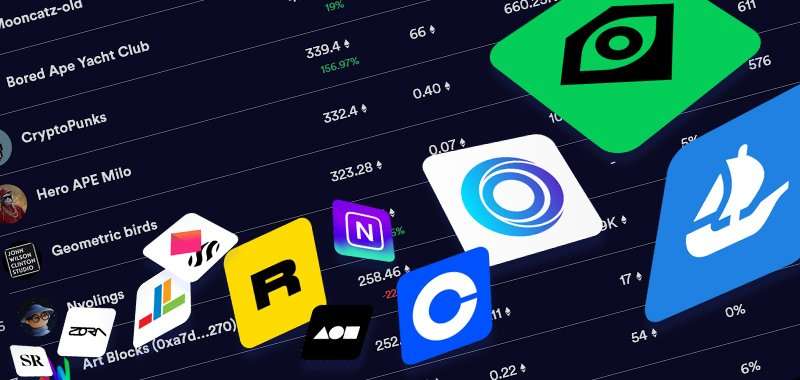Considering the widespread adoption and extravagant market cap, NFTs are no longer unheard of in the cryptoverse. Many new NFT projects and marketplaces have popped up in the past two years, and NFT marketplace aggregators are the best way to assess which platform to use. This brings us to the question: what are NFT marketplace aggregators and what are their benefits?
Understanding NFT Marketplaces
Marketplaces are open platforms (centralized and decentralized) where NFTs are minted and listed for public sales. They play a strategic role in promoting NFTs and connecting creators with potential buyers and investors. In addition, marketplaces also create an avenue for investors to trade and flip NFTs in P2P transactions. NFTs are minted on blockchains with smart contract functionalities such as Ethereum, Binance Smart Chain, Polygon, Solana, etc.
Just as NFTs can be minted on various blockchains, they can also be listed for sale on various marketplaces depending on the creator’s preference. Some marketplaces are more strict when it comes to accepting creators and listing NFTs, while some are open to most (if not all) kinds of NFTs. For example, marketplaces like OpenSea, SolSea, and Rarible accept all types of NFTs, while some other marketplaces are specifically for photo NFTs, music NFTs, and so on.
Since there are numerous marketplaces, prudent investors and enthusiasts often navigate between these marketplaces. Deciding which marketplace to buy from concerning gas fees and other factors can be pretty tiresome. Sometimes, investors might lose out on buying a rare piece while trying to navigate before making their choice, and this is where NFT marketplace aggregators come in.
What are NFT Marketplace Aggregators?
An aggregator can be a person, website, or software that acquires data or information from different resources and displays them to users who might find them helpful. So, an NFT aggregator is a platform that displays multiple NFTs listed on various marketplaces. Such aggregators allow traders and investors to easily trade NFTs from different marketplaces without visiting the actual marketplaces.
These aggregators can be regarded as an all-in-one marketplace because they pool NFTs from various marketplaces and makes buying and selling NFTs seamless for parties involved. They give a broader view of various marketplaces by presenting them to investors and allow them to compare NFT prices, gas fees, royalties, and other considerable factors.
It also saves investors from navigating through various marketplaces and reduces time spent. Aside from all these, marketplace aggregators also make unified purchases possible where investors can purchase NFTs from different sources in a single transaction.
How NFT Marketplace Aggregators Work
NFT marketplace aggregators pool NFT data or information from various sources, dividing them into categories, and feeding it to search engines. Below are the stages involved.
1. Data Pooling
Data pooling involves gathering numerous NFTs’ transactional data from various marketplaces. This pooled information is the spine of every marketplace aggregator.
2. Data Aggregation
The pooled data is gathered in a single catalogue or interface to create a single entry point for the platform. This single entry point makes the accessibility of data seamless when queried.
3. Data Classification
Data classification involves classifying the pooled data with specific metrics or parameters like rarity, timing, price, ranking, etc. This is to make data analysis seamless for potential investors or buyers.
4. Feeding Data to Search Engines
After the above three stages have been executed successfully, the data collated is fed to search engines on the platform so that users can easily track their preferred NFTs.
5. Batch Purchase
One of the critical functions of NFT marketplace aggregators is a batch purchase which allows users to buy multiple NFTs from different marketplaces in a single transaction. This batch purchase saves extra gas fees that would have been charged on each transaction of respective NFTs.
For instance, imagine you want to buy 30 NFTs and have to pay 30 different transaction fees. But with this batch purchase functionality, you’ll only pay transaction fees once for all NFTs.
The main benefits of using NFT aggregators includes:
- Unified Interface
- Rapid Search Efficiency
- Flexible Data Analysis
- Batch Purchase
- Convenience
- Accessibility
- User-friendly interface
Best NFT Aggregators
Genie
Genie is a premier NFT marketplace aggregator co-founded in 2014 by Akash Nigam and Evan Rosenbaum. Uniswap later acquired it on June 21, 2022. Genie aggregator was officially launched in November 2021; it provides users with inventories of NFTs on marketplaces like OpenSea, Rarible, LooksRare, NFTX, NFT20, X2Y2, and many others. It helps investors to save up to 40% on gas fees by allowing them to buy up to 60 NFTs from multiple marketplaces in a single transaction.
You can also sell your NFTs on Genie, which maximizes your exposure by listing your NFTs on OpenSea and LooksRare simultaneously. The platform supports MetaMask, Mobile wallet, and Coinbase wallets.
Gem
Gem is another notable marketplace aggregator co-founded in November 2021 by Lorens Haculak, Josh Thompson, Deepanjal Gupta, and two others. The aggregator protocol went live in January 2022 and rapidly fostered a leading NFT marketplace aggregator. OpenSea later acquired the Gem on April 24, 2022.
Gem runs on the Ethereum network and aggregates NFTs from notable marketplaces like OpenSea, LooksRare, Rarible, Sudoswap, X marketplace, X2Y2, Universe, NFT20, NFTX, etc. It supports minting and selling NFTs and saves users up to 40% gas fees like Genie. The platform supports MetaMask, WalletConnect, and Coinbase wallet.
Rareboard
Rareboard is another notable marketplace aggregator that lists NFTs from various marketplaces on its platform. Aside from being an aggregator, Rareboard has a rarity dashboard for NFTs alongside price inventory for NFTs on various marketplaces. The platform runs on Binance Smart Chain and aggregates some of the largest marketplaces on the BSC network. It incorporates BinanceNFT, PancakeSwap, NFT Trade, Galler.io, etc.
Users can mint and list their NFTs on Rareboard, and it supports MetaMask, WalletConnect, BitKeep, and Binance Chain wallets.
Flip
Flip is another marketplace aggregator co-founded in 2021 by Sam Hotchkiss, Brian Krogsgard, and Jennifer Jacobs. The platform has a custom folder which allows users to curate their NFT experience to their preferences. This means users can follow their favourite collections, wallets, and NFTs for a real-time update whenever they list NFTs for sale; all you need is their Ethereum wallet or ENS name.
The platform currently aggregates from OpenSea and LooksRare, with more marketplaces to be added. It supports the MetaMask wallet with others to be added, and you can sign up on the platform with your wallet, Apple, Google, Twitter, or email.
Making NFT Trading Easier
NFT marketplace aggregators are novel NFT protocols that make trading NFTs seamless with their functionalities. Aside from the aggregators highlighted above, there are other cool NFT aggregators, which include; Blur, NFTGO, Orion, and Ludo.
Want more? Connect with NFT Plazas
Join the Weekly Newsletter
Join our Discord
Follow us on Twitter
Like us on Facebook
Follow us on Instagram
*All investment/financial opinions expressed by NFT Plazas are from the personal research and experience of our site moderators and are intended as educational material only. Individuals are required to fully research any product prior to making any kind of investment.

Technical writer, an enthusiast for everything blockchain and decentralized world.

